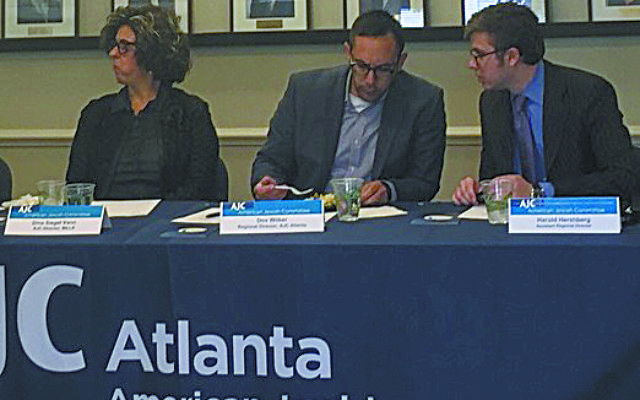AJC Official: Latinos, Jews See Eye to Eye in Parallel
Those who know Atlanta’s history know that it wasn’t always a welcome place for different kinds of folks. That situation made it fertile ground for the civil rights movement of the 1950s and 1960s, after which Atlanta emerged as a symbolic champion of cooperation among previously distinct social groups.
According to Dina Siegel Vann, Atlanta thus is uniquely equipped to foster cooperation between the Jewish and Latino communities.
Siegel Vann is the director of American Jewish Committee’s Arthur and Rochelle Belfer Institute for Latino and Latin American Affairs.

In her AJC role she has traveled widely and developed a network of political contacts. She organized the first Latino-Jewish Leadership Summit in Washington, D.C., in 2001 and the National Conversation on the State of Latino-Jewish Relations in 2013. A regular contributor to the Spanish daily El Pais, Siegel Vann received the Civil Rights Award from the Religious Action Center of Reform Judaism in 2014.
She discussed the challenges facing Latin American communities at a luncheon hosted by AJC on Monday, May 9, before also appearing at the Atlanta Chapter’s annual meeting the next day at 103 West in Buckhead.
At the top of the list of issues: immigration policy.
“Immigration is, many times, only seen from a domestic perspective,” Siegel Vann said. “People don’t understand the root causes of immigration. So, of course, we are also very involved in what’s going on in the countries of origin of those immigrants.”
AJC expressed support for the Alliance for Prosperity in the Northern Triangle, a 2014 initiative by the governments of Guatemala, Honduras and El Salvador to limit emigration.
With Rice University’s Baker Institute, AJC organized a panel discussion in Texas among various Latin American ambassadors to address common misconceptions about Latino immigration.
“One of the arguments is ‘They’re taking away money from schools, from hospitals,’ ” Siegel Vann said. “We showed with numbers that that’s not the case. They are producing much more resources than what they’re taking out.”
Recently, Siegel Vann invited Pulitzer Prize-winning journalist Sonia Nazario to address the Congressional Latino-Jewish Caucus, which was created in 2011 largely through Siegel Vann’s efforts. Nazario spoke about the flow of unaccompanied minors across the U.S.-Mexico border.
“Immigration is a topic where Jews and Latinos see eye to eye,” Siegel Vann said, “both in terms of values and of interests. We’re all immigrants.”
In 2011, AJC collaborated with Latino Decisions, a research firm, to conduct a study on the perception of Jewish issues among Latinos and how the Jewish and Latino communities intersected. The study surveyed 2,000 Latinos in five cities.
“What we discovered is that mostly both communities lead parallel lives,” Siegel Vann said. “One of the things that was fascinating that we discovered was that even though Latinos didn’t know anything about the Middle East or the Palestinian issue, they understood very well and they approved of the Jewish connection to Israel, and I think that has to do a lot with [Latinos’] connection to our countries of origin.”
According to Siegel Vann, another central issue facing Latinos in the United States is a lack of political involvement, particularly in matters of foreign policy.
“We don’t even have one organization today that is involved or focused on foreign policy,” Siegel Vann said.
She has invited Mexico’s 50 consuls general to Washington for AJC’s annual Global Forum from June 5 to 7. The foreign minister of Mexico, Claudia Ruiz Massieu, will be one the main speakers. Because Mexicans make up the largest Latino group in the United States, the presence of those officials is a testament to the opportunities for collaboration between the Latino and Jewish communities.




comments